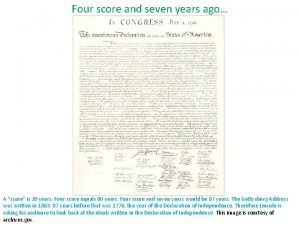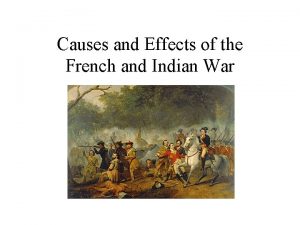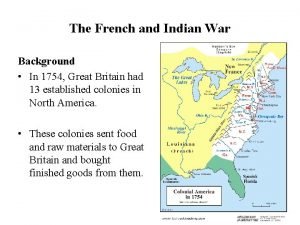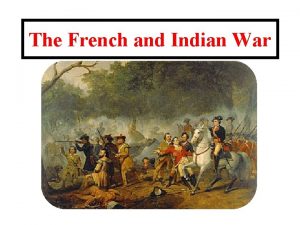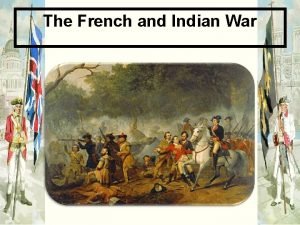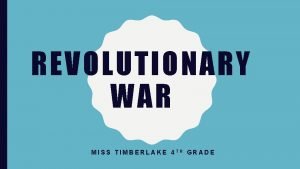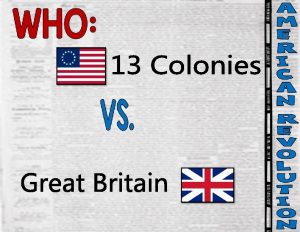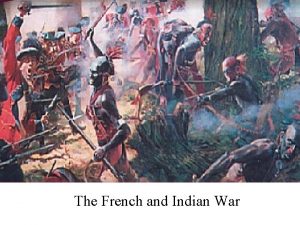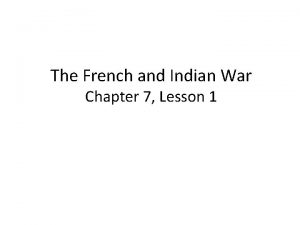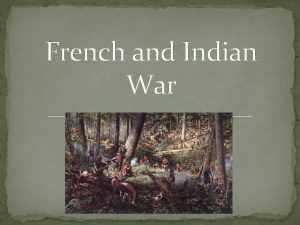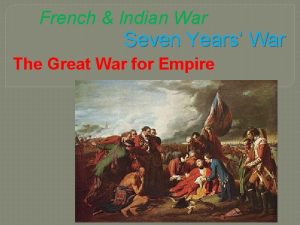The French and Indian War Seven Years War











- Slides: 11

The French and Indian War “Seven Years War” Section 4 – Chapter 4

The Ohio River Valley • As the colonies grew, the colonists began to look west to the Ohio Valley, for more land. • Settlers began pushing west of the Appalachian Mountains. • The Ohio Valley was the states of Kentucky, Ohio, Indiana, Illinois, Wisconsin, Minnesota, and Michigan

Causes of Conflict • The British began claiming rights to the Ohio River Valley. • Both the English and French wanted control of the Ohio River Valley, and both felt that it was rightfully theirs • British wanted more land to expand their colonies westward • French wanted control of Ohio River for transportation, trade & to prevent British intrusion

Forts of the Ohio • The French build Fort Duquesne in the Ohio River Valley • In spring 1754, the governor of Virginia sent a militia to drive out the French. Leading this force was a young Virginian, George Washington. • Washington set up a small fort of his own nearby. He called it Fort Necessity. • Washington's outpost soon came under attack by the French and their Native American allies. Washington and his soldiers were forced to surrender.

Native Americas as Allies • As the conflict got underway, the French and the British both sought Native American help. • The French had a big advantage. They already had many Native American allies. Native Americans generally distrusted the British and their hunger for land. • In contrast, the French were more interested in fur trading than in land. French trappers and fur traders often married Native American women. French missionaries converted many Native Americans to Catholicism. For these reasons, Native Americans helped the French and raided British settlements.

The Colonies in the War • The Albany delegates also talked about how the colonies might work together more closely against the French. • They decided to adopt Benjamin Franklin's Albany Plan of Union for a united colonial government. To form a colonial government, each colony would have to give up some of its powers. Not one colonial assembly was willing to do so. • Disappointed, Franklin wrote, "Everybody cries, a Union is absolutely necessary; but when they come to the manner and form of the union, [they] are perfectly distracted. " • The Albany meeting failed to unify the colonists.

"Unite or Die" by Benjamin Franklin

Turning Point of the War • The French enjoyed early success in the war. They captured several British forts. Meanwhile, their Native American allies raided British settlements. They killed colonists, burned farmhouses and crops, and drove many families back toward the coast. • The turning point came in 1757, when they obtained a new Prime minister William Pitt. He sent more British troops to fight in North America. He also decided that Britain would pay for the cost of war. He knew that, after the war, the British would raise colonists' taxes to help pay the large bill. • William Pitt drove the French out of America. • The war in Europe finally ended with the Treaty of Paris of 1763. This treaty forced France to give Canada and most of its lands east of the Mississippi River to Great Britain also received Florida from France's ally, Spain.

The British Win the War! • The French defeat was a blow to Native Americans in the Ohio River Valley. They had lost their French allies and trading partners and now had to deal with the British. • The British raised the prices of their goods. Unlike the French, the British refused to pay Native Americans to use their land. Worst of all, more colonists began settling in Native American lands. • Britain's King George declared that colonists were not to settle west of the Appalachian Mountains. To enforce the new rule, the British planned to keep 10, 000 troops in America. The Proclamation of 1763 helped remove a source of conflict with Native Americans. It also kept colonists on the coast—where the British could control them. • Colonists believed the proclamation limited their freedom of movement. They feared that the large number of British troops might interfere with their liberties. As a result, distrust began to grow between Britain and its American colonies. • Britain's financial problems also led to trouble. Deeply in debt as a result of the war with France, the British government made plans to tax the colonies and tighten trade rules. These efforts would lead to conflict—and eventually revolution.

Territorial changes following the French and Indian War: land held by the British before 1763 is shown in red, land gained by Britain in 1763 is shown in

Recap • Fight over the Ohio River Valley caused the French and Indian War • Treaty of Paris officially ended the war. • French and Indian war caused Britain to be in debt and tax the colonies • Proclamation of 1763 did not allow the colonist to move west • Important people: George Washington, William Pitt, Benjamin Franklin
 Four score and seven years ago
Four score and seven years ago Causes and effects of the french and indian war
Causes and effects of the french and indian war Where did the french and indian war take place
Where did the french and indian war take place Causes of the french and indian war
Causes of the french and indian war Causes of french and indian war
Causes of french and indian war French and indian war summary
French and indian war summary French and indian war
French and indian war Brainpop french and indian war
Brainpop french and indian war Who was in debt after the french and indian war
Who was in debt after the french and indian war French and indian war
French and indian war French and indian war
French and indian war French and indian war
French and indian war
